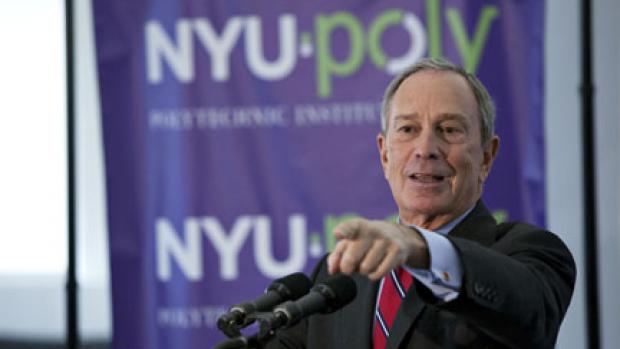Mayor Bloomberg engages entrepreneurs in a lively discussion at NYU-Poly's city-sponsored incubator at 160 Varick St.

If “new economy” described the business world during the first part of this decade, then “improving economy” may be the phrase characterizing it in the second. That was the sentiment at yesterday’s press conference with Mayor Michael Bloomberg, who focused on New York City’s economic future as he engaged the first 27 start-ups in a lively discussion at Polytechnic Institute of NYU’s city-sponsored business incubator.
“The next generation of successful employers is being developed now,” the mayor said. “We want to make sure as many of them as possible start and grow in New York City.”
To achieve that goal, the city partnered with NYU-Poly in February 2009 to create a business incubator for companies representing a range of industries as part of its 11-point plan to promote business innovation through entrepreneurial activity. Located at 160 Varick Street in Manhattan’s TriBeCa neighborhood, the incubator features an IT company catered toward private-sector start-ups, a global fund management firm for feature film production and distribution, an online company that will help patients make informed healthcare decisions, and an energy recovery clean-tech firm, among other businesses. Rents for the companies are at significantly lower-than-market rates, thanks to a three-year lease the city negotiated with Trinity Real Estate, the landlord of the 16,000 square foot space.
“At our old office, we could never have had anyone over,” said Anand Sanwal, CEO of ChubbyBrain, one of the incubator tenants. “It was an embarrassment. This space represents us in a positive way.”
But he’s quick to point to other opportunities more critical to ChubbyBrain’s success: “Being a part of the incubator validates us, when we approach partners or customers. We can say we’ve been vetted by NYU-Poly, which received lots of applications and selected us.”
About 300 companies vied to be a part of NYU-Poly’s business incubator, but only 27 made the cut. The school has another incubator located on its Brooklyn campus.
“It’s just in our blood”
The incubators reflect NYU-Poly’s emphasis on invention, innovation, and entrepreneurship — what it calls its “i2e” philosophy. “For the last 150 years, NYU-Poly has been educating young people who invented new things, created new companies, changed the world. It’s just in our blood,” said NYU-Poly President Jerry Hultin, explaining why the city chose NYU-Poly over many other colleges and universities in New York for the collaboration.
Professor Nasir Memon, who directs the master’s program in cybersecurity at NYU-Poly, credited President Hultin’s support for giving him the confidence to establish Digital Assembly, the digital forensics and data recovery start-up he founded with two of his former students. “When we developed the technology that the company uses today, we never thought we’d create a business. It was just a nice problem to solve,” he said.
The Varick Street tenants get access to business and legal services; for instance, they receive tax advice from experts NYU-Poly discovers through its network with regional colleges and universities. They can also tap into NYU-Poly’s vast student body to find interns or, for those lucky enough to join these companies, new hires.
“The degree of student involvement in the start-ups and the integration of the incubators in academics are unique to the NYU-Poly incubators,” said Bruce Niswander, Director, NYU-Poly.
“Students come in early and they stay late”
Professor Memon sees the good that can come to students who intern at the incubator or with any of the participating companies — and he means that literally. “They dress better,” he laughed. More seriously, he said, “Students would otherwise be in a lab with other students. But coming here and seeing the entrepreneurial spirit and everyone going after their dreams, that puts students in a mental state where they get inspired...There’s a distinct increase in energy. Students come in early and they stay late.”
Amalia Bobeanu, a junior at NYU-Poly, began her internship the day of the mayor’s press conference and exhibited the enthusiasm Mayor Bloomberg and his cohorts say they want to see arise from their efforts. “My classmates and I will develop everything we’ve learned in school, including all the patents being invented,” she said. “It’s positive for us.”
“Less dependence on a single sector”
Ms. Bobeanu and her fellow interns are just the type of enterprising young professionals the city will rely on, along with experienced technologists and engineers, to diversify NYC’s economy.
“Capitalizing on New York City’s unparalleled entrepreneurial talent is one of the driving forces behind our efforts to build a local economy with less dependence on a single sector,” said New York City Economic Development Corporation (NYCEDC) President Seth W. Pinsky.
To that end, the city will create up to four additional incubators, which could house as many as 150 additional start-ups, announced Mayor Bloomberg. “Our first business incubator on Varick Street is a great example of how the public and private sector can work together to promote entrepreneurship,” he said.




